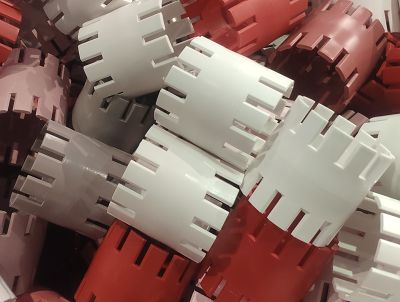Material Hub > Materialien
Materialien
-
Kategorie KunststoffeDichte –Einsatztemperatur, kurzzeitig –
-
Kategorie KunststoffeDichte 0.65 g/cm³Einsatztemperatur, kurzzeitig < 150 °C
-
Kategorie KunststoffeDichte 3 – 3.2 g/cm³Einsatztemperatur, kurzzeitig –
-
Kategorie KunststoffeDichte 3.35 g/cm³Einsatztemperatur, kurzzeitig –
-
Kategorie KunststoffeDichte 3.7 – 3.9 g/cm³Einsatztemperatur, kurzzeitig –
-
Kategorie KunststoffeDichte 3.8 – 4 g/cm³Einsatztemperatur, kurzzeitig –
-
Kategorie KunststoffeDichte 0.92 g/cm³Einsatztemperatur, kurzzeitig < 90 °C
-
Kategorie KunststoffeDichte 0.93 g/cm³Einsatztemperatur, kurzzeitig < 90 °C
-
Kategorie KunststoffeDichte 0.91 g/cm³Einsatztemperatur, kurzzeitig < 150 °C
-
Kategorie KunststoffeDichte 0.91 g/cm³Einsatztemperatur, kurzzeitig < 150 °C
-
Kategorie ThermoplasteDichte 0.9 – 0.92 g/cm³Einsatztemperatur, kurzzeitig < 140 °C
-
Kategorie KeramikDichte 0.94 g/cm³Einsatztemperatur, kurzzeitig 1100 °C
-
Kategorie ThermoplasteDichte 1.5 g/cm³Einsatztemperatur, kurzzeitig 260 °C
-
Kategorie ThermoplasteDichte 2.9 g/cm³Einsatztemperatur, kurzzeitig 260 °C
-
Kategorie ThermoplasteDichte 2.1 g/cm³Einsatztemperatur, kurzzeitig 260 °C
-
Kategorie ThermoplasteDichte 0.9 g/cm³Einsatztemperatur, kurzzeitig 260 °C
-
Kategorie ElastomereDichte > 1.7 g/cm³Einsatztemperatur, kurzzeitig 250 °C
-
Kategorie ElastomereDichte 1.35 g/cm³Einsatztemperatur, kurzzeitig 250 °C
-
Kategorie ElastomereDichte 1.3 g/cm³Einsatztemperatur, kurzzeitig 250 °C
-
Kategorie ElastomereDichte 1.7 g/cm³Einsatztemperatur, kurzzeitig 250 °C





